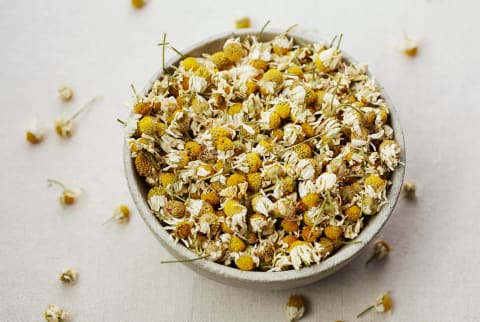Want To Sleep Better & Have Glowing Skin? This Tea May Be The Answer


You're probably most familiar with sipping a cup of chamomile tea around bedtime to help you sleep, but chamomile tea has been linked to many other health benefits beyond its inducing sleep powers. What are the health benefits? How do you brew the perfect cup? We have all your answers.
What is chamomile tea?
Chamomile tea is an herbal tea made from dried flowers of the plant species Matricaria, a relative of the daisy. Surprisingly, the tea does not have an overwhelming floral taste and is slightly sweet. People have been drinking chamomile tea and using its extracts for centuries, making it one of the most prevalent and well-documented medicinal plants1 in the world.
What are the health benefits?
The chamomile plant has traditionally been used in a variety of ways, from an anti-inflammatory agent to a sedative to reduce anxiety and sleep problems and also to treat wounds and ulcers.
Yet, chamomile tea often plays second fiddle to its more popular and well-researched cousins green tea and black tea. Even so, scientists have been increasingly interested in finding out whether or not chamomile tea actually lives up to all the health hype it's received.
May improve sleep quality.
Chamomile tea and its extracts have been used throughout history for calming effects1 and for inducing sleep. Though chamomile tea is naturally caffeine free, its relaxing qualities come from apigenin, which is a chemical found in the plant that binds to receptors in your brain and literally calms your nerves. Who knew this pretty little plant had this superpower?
A total of 80 new moms in Taiwan with poor sleep quality were randomly assigned to either drink one cup of chamomile tea per day for two weeks, in addition to receiving regular health care, or to just receive regular health care. Results showed that the moms who drank the chamomile tea had significant improvements in symptoms related to poor sleep, like excessive daytime drowsiness, irritable mood, and poor concentration. These moms also had significant improvements in postpartum-depression.
Overall, studies investigating chamomile's influence on sleep are still lacking, but many people find this cozy beverage a soothing choice before bed. Whether it's 30 minutes or an hour before you hit the hay, drinking chamomile at night is the best way to unlock its potential benefits for sleep.
May help treat chronic insomnia.
Another study3 looked at chamomile extract as a treatment for chronic insomnia. Instead of drinking tea, people were given either a pill of chamomile extract or a placebo pill for a month. The differences between the two groups in total time slept each night were small, yet the chamomile group reported being able to fall asleep almost 15 minutes faster and reported waking up less in the middle of the night than those getting the placebo pill.
May be protective of some cancers.
Studies have shown that chamomile tea may be beneficial in preventing the growth of cancer cells in skin, prostate, breast, and ovarian cancers before people even begin experiencing symptoms. Extracts from the chamomile plant have been shown to inhibit the growth of these cancerous cells while not harming healthy cells.
Chamomile tea consumption may also be beneficial for preventing thyroid cancer. One study4 published in 2015 found that those drinking chamomile tea two to six times a week were significantly less likely to develop thyroid cancer or have a thyroid disease compared to those who didn't drink chamomile tea.
May improve skin health and inflammation.
Sadly, this isn't a benefit you can reap from drinking tea, but chamomile extracts are often added to cosmetic5 and skin care products like lotions and creams to moisturize skin and reduce inflammation. The oils in the chamomile plant seep into the deep layers of the skin, which is one reason chamomile extracts have also been used to treat eczema1, although it is not the most effective method.
Side effects of chamomile
Some people may have a sensitivity to chamomile and develop an allergic reaction, but luckily, this response is extremely rare. People who are allergic to daisies or plants in the daisy family, like ragweed and chrysanthemums, are more likely to have a reaction to a topical application of chamomile.
What's the bottom line?
Chamomile tea is safe and delicious for most people to drink and use on their skin. Chamomile extracts and tea are associated with numerous health benefits, just remember that not all benefits have been rigorously vetted or confirmed in research trials (such as chamomile's role in preventing osteoporosis6, improving blood sugar control7, alleviating digestive issues8, and promoting heart health). Still, chamomile is one of the best nighttime tea options if you're looking to catch some zzz's.
Brewing Chamomile Tea 101
If you're interested in trying chamomile tea, here are a few tips for brewing the perfect cup.
You can either brew the tea using dried chamomile flowers or, more conveniently, from tea bags purchased at the store.
If you choose dried flowers, add one large teaspoon for every cup of water, but feel free to add more for a stronger flavor. The water should be boiling hot (careful not to burn yourself!). The leaves should steep 10 to 15 minutes uncovered, or three to five minutes covered. Add a squeeze of honey in the last few minutes of brewing for extra sweetness if desired, and get ready to sit back and relax!

Molly Knudsen, M.S., RDN is a Registered Dietician Nutritionist and mindbodygreen's supplements editor. She holds a bachelor’s degree in nutrition from Texas Christian University and a master’s in nutrition interventions, communication, and behavior change from Tufts University. She lives in Boston, Massachusetts and enjoys connecting people to the food they eat and how it influences health and wellbeing.
8 Sources
- https://www.ncbi.nlm.nih.gov/pubmed/21132119
- https://www.ncbi.nlm.nih.gov/pubmed/26483209
- https://www.ncbi.nlm.nih.gov/pubmed/21939549
- https://www.ncbi.nlm.nih.gov/pubmed/25842380
- https://www.ncbi.nlm.nih.gov/pmc/articles/PMC2958188/pdf/jcad_2_1_36.pdf
- https://www.ncbi.nlm.nih.gov/pubmed/15537303
- https://www.ncbi.nlm.nih.gov/pubmed/18681440
- https://www.ncbi.nlm.nih.gov/pubmed/16628544